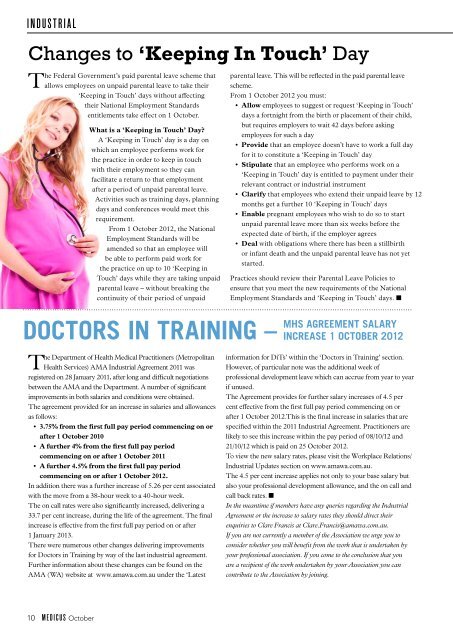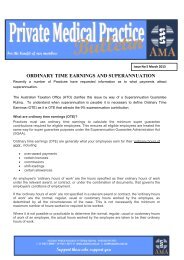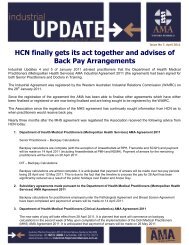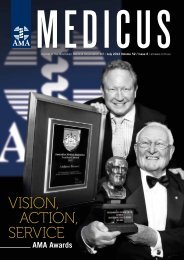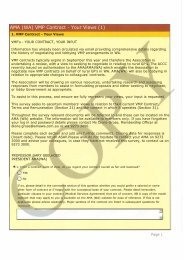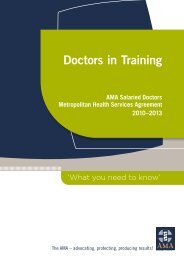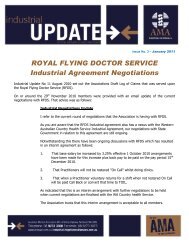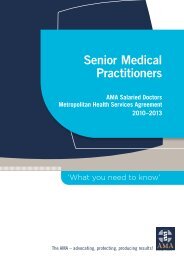twrama 1990_final oc.. - AMA WA
twrama 1990_final oc.. - AMA WA
twrama 1990_final oc.. - AMA WA
You also want an ePaper? Increase the reach of your titles
YUMPU automatically turns print PDFs into web optimized ePapers that Google loves.
INDUSTRIAL<br />
Changes to ‘Keeping In Touch’ Day<br />
The Federal Government’s paid parental leave scheme that<br />
allows employees on unpaid parental leave to take their<br />
‘Keeping in Touch’ days without affecting<br />
their National Employment Standards<br />
entitlements take effect on 1 October.<br />
What is a ‘Keeping in Touch’ Day?<br />
A ‘Keeping in Touch’ day is a day on<br />
which an employee performs work for<br />
the practice in order to keep in touch<br />
with their employment so they can<br />
facilitate a return to that employment<br />
after a period of unpaid parental leave.<br />
Activities such as training days, planning<br />
days and conferences would meet this<br />
requirement.<br />
From 1 October 2012, the National<br />
Employment Standards will be<br />
amended so that an employee will<br />
be able to perform paid work for<br />
the practice on up to 10 ‘Keeping in<br />
Touch’ days while they are taking unpaid<br />
parental leave – without breaking the<br />
continuity of their period of unpaid<br />
D<strong>oc</strong>tors in Training –<br />
The Department of Health Medical Practitioners (Metropolitan<br />
Health Services) <strong>AMA</strong> Industrial Agreement 2011 was<br />
registered on 28 January 2011, after long and difficult negotiations<br />
between the <strong>AMA</strong> and the Department. A number of significant<br />
improvements in both salaries and conditions were obtained.<br />
The agreement provided for an increase in salaries and allowances<br />
as follows:<br />
• 3.75% from the first full pay period commencing on or<br />
after 1 October 2010<br />
• A further 4% from the first full pay period<br />
commencing on or after 1 October 2011<br />
• A further 4.5% from the first full pay period<br />
commencing on or after 1 October 2012.<br />
In addition there was a further increase of 5.26 per cent ass<strong>oc</strong>iated<br />
with the move from a 38-hour week to a 40-hour week.<br />
The on call rates were also significantly increased, delivering a<br />
33.7 per cent increase, during the life of the agreement. The <strong>final</strong><br />
increase is effective from the first full pay period on or after<br />
1 January 2013.<br />
There were numerous other changes delivering improvements<br />
for D<strong>oc</strong>tors in Training by way of the last industrial agreement.<br />
Further information about these changes can be found on the<br />
<strong>AMA</strong> (<strong>WA</strong>) website at www.amawa.com.au under the ‘Latest<br />
parental leave. This will be reflected in the paid parental leave<br />
scheme.<br />
From 1 October 2012 you must:<br />
• Allow employees to suggest or request ‘Keeping in Touch’<br />
days a fortnight from the birth or placement of their child,<br />
but requires employers to wait 42 days before asking<br />
employees for such a day<br />
• Provide that an employee doesn’t have to work a full day<br />
for it to constitute a ‘Keeping in Touch’ day<br />
• Stipulate that an employee who performs work on a<br />
‘Keeping in Touch’ day is entitled to payment under their<br />
relevant contract or industrial instrument<br />
• Clarify that employees who extend their unpaid leave by 12<br />
months get a further 10 ‘Keeping in Touch’ days<br />
• Enable pregnant employees who wish to do so to start<br />
unpaid parental leave more than six weeks before the<br />
expected date of birth, if the employer agrees<br />
• Deal with obligations where there has been a stillbirth<br />
or infant death and the unpaid parental leave has not yet<br />
started.<br />
Practices should review their Parental Leave Policies to<br />
ensure that you meet the new requirements of the National<br />
Employment Standards and ‘Keeping in Touch’ days. ■<br />
MHS Agreement Salary<br />
increase 1 October 2012<br />
information for DiTs’ within the ‘D<strong>oc</strong>tors in Training’ section.<br />
However, of particular note was the additional week of<br />
professional development leave which can accrue from year to year<br />
if unused.<br />
The Agreement provides for further salary increases of 4.5 per<br />
cent effective from the first full pay period commencing on or<br />
after 1 October 2012.This is the <strong>final</strong> increase in salaries that are<br />
specified within the 2011 Industrial Agreement. Practitioners are<br />
likely to see this increase within the pay period of 08/10/12 and<br />
21/10/12 which is paid on 25 October 2012.<br />
To view the new salary rates, please visit the Workplace Relations/<br />
Industrial Updates section on www.amawa.com.au.<br />
The 4.5 per cent increase applies not only to your base salary but<br />
also your professional development allowance, and the on call and<br />
call back rates. ■<br />
In the meantime if members have any queries regarding the Industrial<br />
Agreement or the increase to salary rates they should direct their<br />
enquiries to Clare Francis at Clare.Francis@amawa.com.au.<br />
If you are not currently a member of the Ass<strong>oc</strong>iation we urge you to<br />
consider whether you will benefit from the work that is undertaken by<br />
your professional ass<strong>oc</strong>iation. If you come to the conclusion that you<br />
are a recipient of the work undertaken by your Ass<strong>oc</strong>iation you can<br />
contribute to the Ass<strong>oc</strong>iation by joining.<br />
10 MEDICUS October


